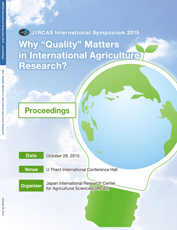Why the Quality of Growth Matter? - from JICA's experiences

The year 2015 marks 70 years since the end of World War II. 2015 is the target year of the Millennium
Development Goals (MDGs) as well as the launch year of the Sustainable Development Goals (SDGs). As
for Japan, the National Diet approved the new Development Cooperation Charter in February. Indeed, 2015
turned out to be a milestone year for development.
The international common framework for official development assistance (ODA) was established in the
early 1960s when the development gap had been recognized as a North-South divide. Since then, the goal
of eliminating socio-economic gaps has been the most fundamental challenge of development. Over the
past decades, the world has witnessed remarkable progress in poverty reduction and improvements in social
indicators, such as health, education and gender. The collective efforts among development partners, guided
by the MDGs, have largely contributed to these achievements.
The Development Cooperation Charter of Japan stipulates the importance of "quality growth" and poverty
eradication through such growth, as well as a human security model that focuses on individuals and
cooperation for their protection and empowerment. It states that "quality growth" should be: inclusive, in that
the fruits of growth are shared within society as a whole, leaving no one behind; sustainable over generations
in terms of consideration to, among other aspects, harmony with the environment, sustained socio-economic
growth, and the need to address global warming; and resilient, able to withstand and recover from economic
crises, natural disasters and other shocks. Japan's ODA, guided by the charter, should pursue "quality growth"
that is inclusive, sustainable and resilient, while continuing to support the achievement of economic growth.
There are many issues around policy and academic debates on "quality growth." For instance, some may
say that the "quality" aspects of growth hamper the "quantitative" aspects of growth. On the other hand, a
positive correlation between the two may exist, given that inclusive, sustainable and resilient growth may
accelerate quantitative growth. Meanwhile innovations in technology can trigger positive and far-reaching
transformations toward "quality growth."
"Quality growth" is not only a development issue for developing countries but a global common agenda for
all countries, including Japan. The world will have to face many challenges in the days to come: economic
crises, natural disasters, climate change, etc.
This presentation will try to illustrate what it is meant by “quality growth” drawing on some Japanese
experiences in development cooperation.
| Date of issued | |
|---|---|
| Creator | Ichiro Tambo |
| Subject |
quality growth inclusiveness reslience sustainability innovation |
| Publisher | Japan International Research Center for Agricultural Sciences |
| Available Online | |
| Issue | 2015 |
| spage | 33 |
| epage | 45 |
| Rights | Japan International Research Center for Agricultural Sciences |
| Language | eng |
